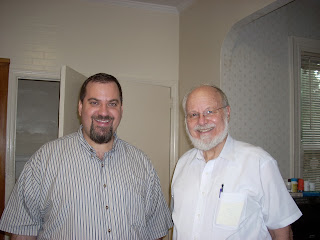Is same-sex marriage a civil right?
Cross-posted on DovBear
On Tuesday, voters in Maine struck down a law that had been passed by the legislature allowing gay marriage. In an off-year election such as this, the ones coming out to vote were the conservative "values voters" whose opposition to gay marriage drove them to the polls in modest, but large enough, numbers to overturn the gay marriage law.
Voters have now voted to maintain the legal definition of marriage as between a man and a woman in over 30 states now. But these are undoubtedly only temporary setbacks for gay marriage rights activists. The youth of this country overwhelmingly support the right to same-sex marriage. They essentially feel "what's the big deal?" As older voters disappear from the voting pool and younger voters enter it, gay marriage will eventually become protected in all 50 states, either by court action and insufficient opposition to change that legislatively, or in the legislature, or through ballot initiatives in the first place. But it may take a couple of decades before we get to that point.
As you can guess from the tone of this post so far, I support same-sex marriage rights. But some 16 months ago, I wrote a post supporting civil unions for everyone, and doing away with official government sanction of marriage entirely as a violation of the church-state divide.
I still believe that as an ideal. But in the real world, the institution of marriage as registered by the state isn't going to disappear anytime soon. American society isn't going to let go of state recognized marriage for a long, long time. So insisting only on the route of civil unions for everyone is a nonstarter and will deny rights to same-sex couples for years to come. For the meantime, however, there can certainly be a concept of civil marriage that is entirely divorced (if you'll pardon the term) from church sanctioned marriage. Civil, secular marriage has a long history in this country, going back to the Puritans. "For them, marriage was a civil union, a contract, not a sacred rite." (Mark A. Peterson: "Civil Unions in the City on a Hill")
As a practicing Jew, I don't demand that the government recognize the rules of my religion as state law, for example having shabbat on Saturday, so why should I, or any person of any faith, have a veto over who can get married?
That certainly doesn't preclude any private religious group from maintaining that a marriage is between a man and a woman and restricting membership in their own group to those who believe and practice the same. But they shouldn't be allowed to make that definition the civil definition of marriage as well and impose their will on a secular society.
On Tuesday, voters in Maine struck down a law that had been passed by the legislature allowing gay marriage. In an off-year election such as this, the ones coming out to vote were the conservative "values voters" whose opposition to gay marriage drove them to the polls in modest, but large enough, numbers to overturn the gay marriage law.
Voters have now voted to maintain the legal definition of marriage as between a man and a woman in over 30 states now. But these are undoubtedly only temporary setbacks for gay marriage rights activists. The youth of this country overwhelmingly support the right to same-sex marriage. They essentially feel "what's the big deal?" As older voters disappear from the voting pool and younger voters enter it, gay marriage will eventually become protected in all 50 states, either by court action and insufficient opposition to change that legislatively, or in the legislature, or through ballot initiatives in the first place. But it may take a couple of decades before we get to that point.
As you can guess from the tone of this post so far, I support same-sex marriage rights. But some 16 months ago, I wrote a post supporting civil unions for everyone, and doing away with official government sanction of marriage entirely as a violation of the church-state divide.
I still believe that as an ideal. But in the real world, the institution of marriage as registered by the state isn't going to disappear anytime soon. American society isn't going to let go of state recognized marriage for a long, long time. So insisting only on the route of civil unions for everyone is a nonstarter and will deny rights to same-sex couples for years to come. For the meantime, however, there can certainly be a concept of civil marriage that is entirely divorced (if you'll pardon the term) from church sanctioned marriage. Civil, secular marriage has a long history in this country, going back to the Puritans. "For them, marriage was a civil union, a contract, not a sacred rite." (Mark A. Peterson: "Civil Unions in the City on a Hill")
As a practicing Jew, I don't demand that the government recognize the rules of my religion as state law, for example having shabbat on Saturday, so why should I, or any person of any faith, have a veto over who can get married?
That certainly doesn't preclude any private religious group from maintaining that a marriage is between a man and a woman and restricting membership in their own group to those who believe and practice the same. But they shouldn't be allowed to make that definition the civil definition of marriage as well and impose their will on a secular society.

Comments
Post a Comment